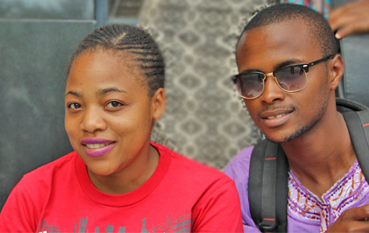 THE National University of Science and Technology (NUST), the country’s first and leading technology, engineering and mathematics (STEM)-oriented university, is leading a research in the development of capacity to produce Covid-19 and other pathogens testing reagents, a major breakthrough in the fight against the pandemic and handling of other diseases like HIV/Aids.
THE National University of Science and Technology (NUST), the country’s first and leading technology, engineering and mathematics (STEM)-oriented university, is leading a research in the development of capacity to produce Covid-19 and other pathogens testing reagents, a major breakthrough in the fight against the pandemic and handling of other diseases like HIV/Aids.
NUST, a leader in human capital development for industrial and socio-economic transformation, with a bias towards STEM, is delivering cutting edge research and innovations that are driving industrialisation locally and beyond.
The University is home to the country’s first centre for DNA Testing services, which is housed at the Applied Genetic Testing Centre (AGTC).
Before the establishment of AGTC, the country was losing foreign currency in accessing DNA Testing services in South Africa and Europe.
The AGTC has distinguished itself as the most trusted and affordable DNA Testing centre in the country.
Recently, AGTC received the Medal of Meritorious Service Commendation Award from His Excellency, the President of the Republic of Zimbabwe, Cde Emmerson Dambudzo Mnangagwa.
AGTC has performed over 3 000 human and DNA identification tests, servicing clients across the country and collaborating with foreign laboratories in the United Kingdom and Australia in human identification for immigration purposes.
The country’s premier DNA Testing Centre offers forensic services to different Government departments including the Zimbabwe Republic Police (ZRP) and the Civil Protection Unit (CPU).
AGTC has assisted in the identification of complex forensic and national disaster victims, notably, victims who were burnt beyond recognition in road traffic accidents in the Mvuma Bus Disaster (23 victims), Mvurwi Bus Accident (11 victims), Guruve Commuter Omnibus (6 victims), West Nicholson Bus Disaster (32 victims), Beitbridge (4 Victims) and an explosion in Lionsden (5 victims).
AGTC has solved over 1 000 forensic cases for the Zimbabwe Republic Police including murder, sexual assault, unlawful entry and stock-theft.
The Centre is currently working on the identification of over 150 Cyclone Idai Victims who were buried unidentified in Mozambique. The complex exercise is set to be completed in October 2021.
When Covid-19 hit the country in early 2020, AGTC used its equipment and deployed staff to set up a PCR Testing Centre at the National TB Reference Laboratory at Mpilo Hospital from April to December 2020, servicing five provinces of Bulawayo, Matabeleland North, Matabeleland South, Masvingo and Midlands. By the time the Government took over the testing programme, AGTC had tested over 40 000 samples.
Currently, AGTC is leading a research in the development of capacity to produce Covid-19 (and other pathogens) testing reagents, a major breakthrough in the fight against the pandemic and handling of other diseases like HIV/Aids.
Also, through the Core TeleInfrastructure Global Capsule, the first of its kind in Africa, NUST accelerates global multidisciplinary research collaboration in the continent.
Renowned for pioneering industry-based learning, which is key in the implementation of the Heritage-Based Education 5.0, the University offers undergraduate and postgraduate degree programmes in seven Faculties and three centres.
Through the Faculties of Applied Science, Engineering, Medicine, The Built Environment, Science and Technology Education, Communication and Information Science, Commerce, Graduate School of Business, Institute of Development Studies and the Centre for Continuing Education, NUST churns out graduates who are able to stand in academia, multidisciplinary research, innovation and the world of industry at large with confidence.
The main goal of NUST is to train students to make an impact in society with the creative and innovative skills imparted during their education experience that is consistently rated among the best locally and beyond.
Employers value NUST graduates for their combination of theoretical and practical experience, as well as their good communication and technological skills.
NUST is committed to producing innovative and entrepreneurial graduates whose qualifications are locally and internationally recognised, underpinned by values of engaged citizenship.
For example, fifth and final year Industrial and Manufacturing Engineering student, Tafadzwa Banga (23), has lifted the country’s flag high after being selected one of the top 10 young innovators by Space in Africa.
Banga, the only Zimbabwean, is part of the African Space Industry Top 10 under 30 – Class of 2021 together with other researchers and innovators from other African countries namely Algeria, Nigeria, Egypt (two), Mauritius, Ethiopia (two), Angola and Sierra Leone.
The youthful NUST innovator is also the Space Generation Advisory Council (SGAC) National Point of Contact (NPoC) for Zimbabwe, having joined SGAC in 2019.
Banga and his team launched a student-designed electronic payload in near space using a high-altitude balloon, the first-ever space-related project for Zimbabwe.
The launch made a significant impact on the awareness of space education and breast cancer.
Though young, NUST is one university with giant footprints.
The University’s researchers, academics and students collaborate with industry, government, non-governmental organisations, and other leading institutions to solve real societal problems and transform lives.
Research and innovations from NUST contribute significantly to public policy formation and set agenda on national discourses.
The institution was recently awarded the Jairos Jiri Humanitarian Award for its outstanding work in the practicalisation of Heritage-based Education 5.0 in the fight against Covid-19 pandemic.
NUST led from the front in support of His Excellency, President Dr Emmerson Mnangagwa’s fight against the pandemic.
When Covid-19 hit the country, NUST was among the local universities that came up with different response strategies.
Through the Innovation Hub, NUST started manufacturing sanitisers, disinfectants and face-masks.
Working with a group of researchers from the Departments of Chemical Engineering and Applied Chemistry, the Innovation Hub set up a sanitiser production team.
Since 2020, the plant has produced over 400 000 litres of sanitiser trading under the trade name NUSTISER, which was certified by the Standards Association of Zimbabwe (SAZ) under their standard ARS ZWS HS 1470:2020.
In addition to sanitiser production, the sanitiser production plant was retrofitted to produce disinfectants in the form of 3% Hydrogen Peroxide as well as Hypochlorite based disinfectants.
To date over 200 000 litres of disinfectant have been produced at the plant.
Also, working with researchers from the Department of Fibre and Polymer Science, the Innovation Hub embarked on the production of PPEs.
As part of our community outreach programme and efforts to mainstream a STEM culture, NUST offers disadvantaged high school students an opportunity to engage with learned academics towards better understanding of the challenging science subjects through the Schools Enrichment Programme (NUSTSEP).
This ensures that Zimbabweans enjoy inclusive and equitable education through promotion of life-long learning opportunities for all, as mandated by the Sustainable Development Goals (SDGs).





 The National University of Science and Technology (NUST) has appointed experienced medical doctor, Professor Elopy Sibanda as the institution’s executive dean in the Faculty of Medicine.
The National University of Science and Technology (NUST) has appointed experienced medical doctor, Professor Elopy Sibanda as the institution’s executive dean in the Faculty of Medicine.



